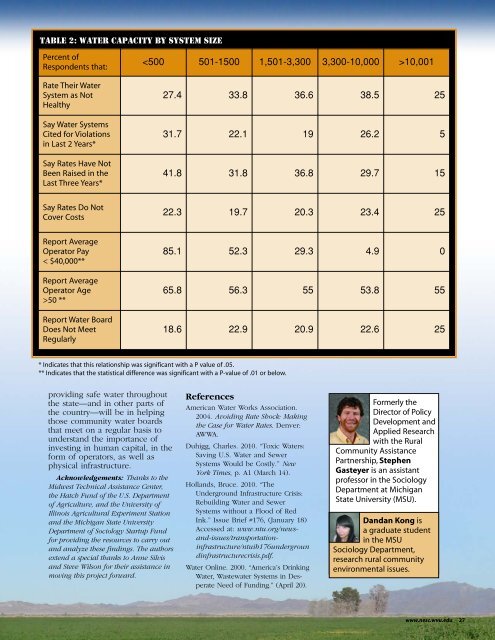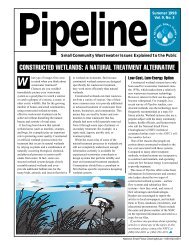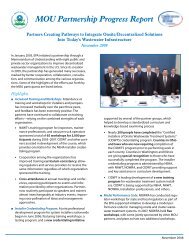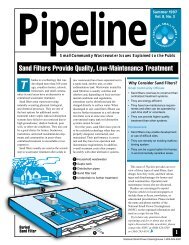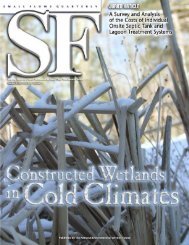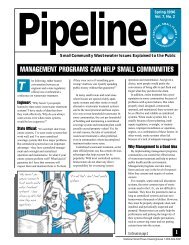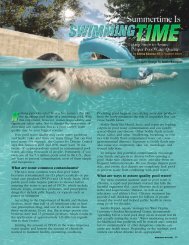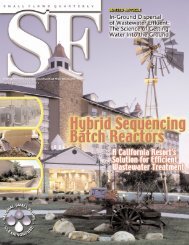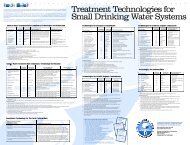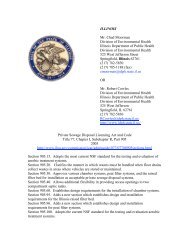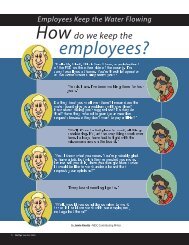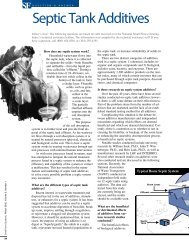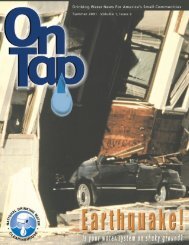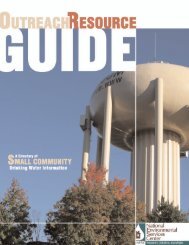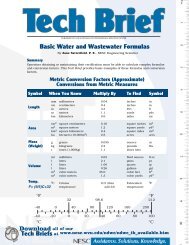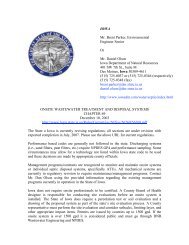Are Small Community Water Systems More at Risk than Other ...
Are Small Community Water Systems More at Risk than Other ...
Are Small Community Water Systems More at Risk than Other ...
Create successful ePaper yourself
Turn your PDF publications into a flip-book with our unique Google optimized e-Paper software.
TABLE 2: WATER CAPACITY BY SYSTEM SIZE<br />
Percent of<br />
Respondents th<strong>at</strong>:<br />
R<strong>at</strong>e Their <strong>W<strong>at</strong>er</strong><br />
System as Not<br />
Healthy<br />
Say <strong>W<strong>at</strong>er</strong> <strong>Systems</strong><br />
Cited for Viol<strong>at</strong>ions<br />
in Last 2 Years*<br />
Say R<strong>at</strong>es Have Not<br />
Been Raised in the<br />
Last Three Years*<br />
10,001<br />
27.4 33.8 36.6 38.5 25<br />
31.7 22.1 19 26.2 5<br />
41.8 31.8 36.8 29.7 15<br />
Say R<strong>at</strong>es Do Not<br />
Cover Costs<br />
22.3 19.7 20.3 23.4 25<br />
Report Average<br />
Oper<strong>at</strong>or Pay<br />
< $40,000**<br />
Report Average<br />
Oper<strong>at</strong>or Age<br />
>50 **<br />
Report <strong>W<strong>at</strong>er</strong> Board<br />
Does Not Meet<br />
Regularly<br />
85.1 52.3 29.3 4.9 0<br />
65.8 56.3 55 53.8 55<br />
18.6 22.9 20.9 22.6 25<br />
* Indic<strong>at</strong>es th<strong>at</strong> this rel<strong>at</strong>ionship was significant with a P value of .05.<br />
** Indic<strong>at</strong>es th<strong>at</strong> the st<strong>at</strong>istical difference was significant with a P-value of .01 or below.<br />
providing safe w<strong>at</strong>er throughout<br />
the st<strong>at</strong>e—and in other parts of<br />
the country—will be in helping<br />
those community w<strong>at</strong>er boards<br />
th<strong>at</strong> meet on a regular basis to<br />
understand the importance of<br />
investing in human capital, in the<br />
form of oper<strong>at</strong>ors, as well as<br />
physical infrastructure.<br />
Acknowledgements: Thanks to the<br />
Midwest Technical Assistance Center,<br />
the H<strong>at</strong>ch Fund of the U.S. Department<br />
of Agriculture, and the University of<br />
Illinois Agricultural Experiment St<strong>at</strong>ion<br />
and the Michigan St<strong>at</strong>e University<br />
Department of Sociology Startup Fund<br />
for providing the resources to carry out<br />
and analyze these findings. The authors<br />
extend a special <strong>than</strong>ks to Anne Silvis<br />
and Steve Wilson for their assistance in<br />
moving this project forward.<br />
References<br />
American <strong>W<strong>at</strong>er</strong> Works Associ<strong>at</strong>ion.<br />
2004. Avoiding R<strong>at</strong>e Shock: Making<br />
the Case for <strong>W<strong>at</strong>er</strong> R<strong>at</strong>es. Denver:<br />
AWWA.<br />
Duhigg, Charles. 2010. “Toxic <strong>W<strong>at</strong>er</strong>s:<br />
Saving U.S. <strong>W<strong>at</strong>er</strong> and Sewer<br />
<strong>Systems</strong> Would be Costly.” New<br />
York Times, p. A1 (March 14).<br />
Hollands, Bruce. 2010. “The<br />
Underground Infrastructure Crisis:<br />
Rebuilding <strong>W<strong>at</strong>er</strong> and Sewer<br />
<strong>Systems</strong> without a Flood of Red<br />
Ink.” Issue Brief #176, (January 18)<br />
Accessed <strong>at</strong>: www.ntu.org/newsand-issues/transport<strong>at</strong>ioninfrastructure/ntuib176undergroun<br />
dinfrastructurecrisis.pdf.<br />
<strong>W<strong>at</strong>er</strong> Online. 2000. “America’s Drinking<br />
<strong>W<strong>at</strong>er</strong>, Wastew<strong>at</strong>er <strong>Systems</strong> in Desper<strong>at</strong>e<br />
Need of Funding.” (April 20).<br />
Formerly the<br />
Director of Policy<br />
Development and<br />
Applied Research<br />
with the Rural<br />
<strong>Community</strong> Assistance<br />
Partnership, Stephen<br />
Gasteyer is an assistant<br />
professor in the Sociology<br />
Department <strong>at</strong> Michigan<br />
St<strong>at</strong>e University (MSU).<br />
Dandan Kong is<br />
a gradu<strong>at</strong>e student<br />
in the MSU<br />
Sociology Department,<br />
research rural community<br />
environmental issues.<br />
www.nesc.wvu.edu 27


